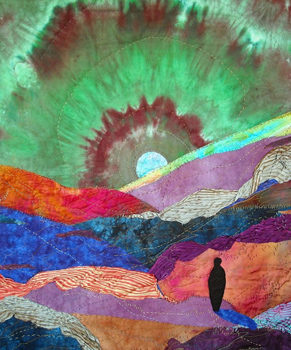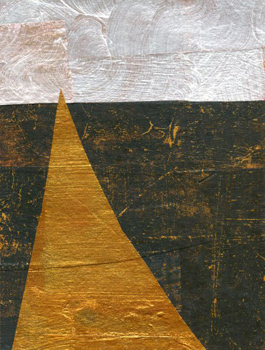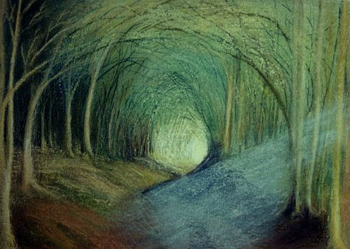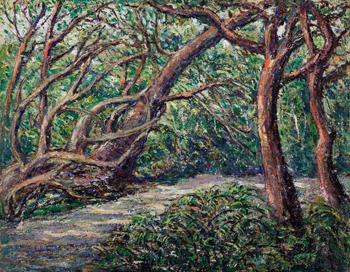For Sunday December 9, 2018
Lectionary Readings (Revised Common Lectionary, Year C)
Malachi 3:1-4
Luke 1:68-79
Phillipians 1:3-11
Luke 3:1-6
In this week’s Gospel, we read that the word of the Lord came to John in the wilderness. Why the wilderness? Why such a barren and desolate setting? If you have any experience in real estate, you know the mantra: “Location location location.” Location is key. The place where we stand, the terrain we occupy, the space from which we speak — these things matter.
I’ve never seen John the Baptist featured in an Advent calender or a Christmas display, but all four Gospels place him front and center in Jesus’s origin story. John’s gaunt austerity is the only gateway we have to the swaddling clothes, angel's wings, and fleecy lambs we hold dear each December. As baffling as it may seem, the holy drama of the season depends on the locust-eating baptizer’s opening act. So again, why the wilderness? Why does Advent begin in the wilderness?
Our Gospel reading for the week takes pains to position John very carefully in time and space: “In the fifteenth year of the reign of Tiberius,” St. Luke writes, “when Pontius Pilate was governor of Judea, and Herod was ruler of Galilee, and his brother Philip ruler of the region of Ituraea and Trachonitis, and Lysanias ruler of Abilene, during the high priesthood of Annas and Caiaphas,” John heard God’s word in the wilderness. That’s seven seats of wealth, power, and influence in just one sentence. Seven centers of authority, both political and religious. Seven Very Important People occupying seven Very Important Positions. But God’s word doesn’t come to any of them.
 |
Perhaps the first wilderness lesson, then, is a lesson about power. The Gospel highlights a startling juxtaposition between those who experience God’s speaking presence and those who don’t. In Luke’s account, emperors, governors, rulers, and high priests — the folks who wield power — don’t hear God, but the outsider from the wilderness does. What is it about power that deafens us to the Word? Maybe Tiberius, Pilate, Caiaphas, and Herod can’t receive a fresh revelation from God because they presume to hear and speak for God already. After all, they’re in power. Doesn’t that mean that they embody God’s will automatically? If not, well, who cares? They already have pomp, money, military might, and the weight of religious tradition at their disposal. They don’t need God.
But in the wilderness? In the wilderness, there’s no safety net. No Plan B. No savings account or National Guard. In the wilderness, life is raw and risky, and our illusions of self-sufficiency fall apart fast. To locate ourselves at the outskirts of power is to confess our vulnerability in the starkest terms. In the wilderness, we have no choice but to wait and watch as if our lives depend on God showing up. Because they do. And it’s into such an environment — an environment so far removed from power as to make power laughable — that the word of God comes.
But Luke goes on. Not only is the wilderness a place that exposes our need for God. It’s a place that calls us to repentance. “John went into all the region around the Jordan,” Luke tells us, “proclaiming a baptism of repentance for the forgiveness of sins.” Elsewhere in the Gospels, we read that crowds streamed into the wilderness to heed John’s call. In other words, they left the lives they knew best, and ventured into the unknown to save their hearts through repentance. Something about the wilderness brought people to their knees.
 |
For us 21st century Christians, though, “sin” and “repentance” are loaded words we try to avoid. Many of us, particularly those of us who grew up in fundamentalist circles, actively dislike the word “sin.” We associate it with paralyzing guilt and eternal hellfire. With fear and self-loathing rather than grace and mercy.
Many of us also distrust the word because we've seen how easily it can be manipulated to justify one moralistic agenda over another. In some churches, abortion and homosexuality are the big, bad sins, while our rape of this planet and our systemic disregard for the poor are not. In others, the capital "S" sins include hawkish foreign policy, capital punishment, and corporate greed. Not unloving sex, mind-numbing busyness, and intellectual snobbery.
And yet, Advent begins with an honest, wilderness-style reckoning with sin. We can’t get to the manger unless we go through John, and John is all about repentance. Is it possible that this might become an occasion for relief? Maybe, if we can get past our baggage and follow John out into the wilderness, we will find comfort in the fact that something more profound and deep is at stake in our souls than "I make mistakes sometimes," or "I have a few issues."
 |
What is sin? Growing up, I was taught that sin is "breaking God's laws." Or "missing the mark," as an archer misses his target. Or "committing immoral acts." These definitions aren't wrong, but they assume that sin is a problem primarily because it angers God. But God's temper is not what's at stake; he's more than capable of managing his own emotions. Sin is a problem because it kills. It kills us. Why? Because sin is a refusal to become fully human. It's anything that interferes with the opening up of our whole hearts to God, to others, to creation, and to ourselves. Sin is estrangement, disconnection, sterility, disharmony. It's the slow accumulation of dust, choking the soul. It's the sludge that slows us down, that says, "Quit. Stop trying. Give up. Change is impossible."
Sin is apathy. Care-less-ness. A frightened resistance to an engaged life. Sin is the opposite of creativity, the opposite of abundance, the opposite of flourishing. It is a walking death. And it is easier to spot, name, and confess a walking death in the wilderness than it is anywhere else.
Finally, Luke suggests that the wilderness is a place where we can see the landscape whole, and participate in God’s great work of leveling inequality and oppression. Quoting the prophet Isaiah, Luke predicts a day when “every valley shall be filled, and every mountain and hill made low, and the crooked shall be made straight, and the rough ways made smooth.”
 |
Unless we’re in the wilderness, it’s hard to see our own privilege, and even harder to imagine giving it up. No one standing on a mountaintop wants the mountain to be flattened. But when we’re wandering in the wilderness, and immense, barren landscapes stretch out before us in every direction, we’re able to see what privileged locations obscure. Suddenly, we feel the rough places beneath our feet. We experience what it’s like to struggle down twisty, crooked paths. We glimpse arrogance in the mountains and desolation in the valleys, and we begin to dream God’s dream of a wholly reimagined landscape. A landscape so smooth and straight, it enables “all flesh” to see the salvation of God.
Where are you located during this Advent season? How close are you to power, and how open are you to risking the wilderness to hear a word from God? What might repentance look like for you, here and now? Where is God leveling the ground you stand on, and what will it take for you to participate in that uncomfortable but essential work?
Location location location. The word of the Lord came to John in the wilderness. May it come to us, too. Like John, may we become brave voices in hard places, preparing the way of the Lord.
Image credits: (1) Missale.net; (2) AdventDoor.com; (3) Art Is Hard; and (4) www.1stdibs.com.





